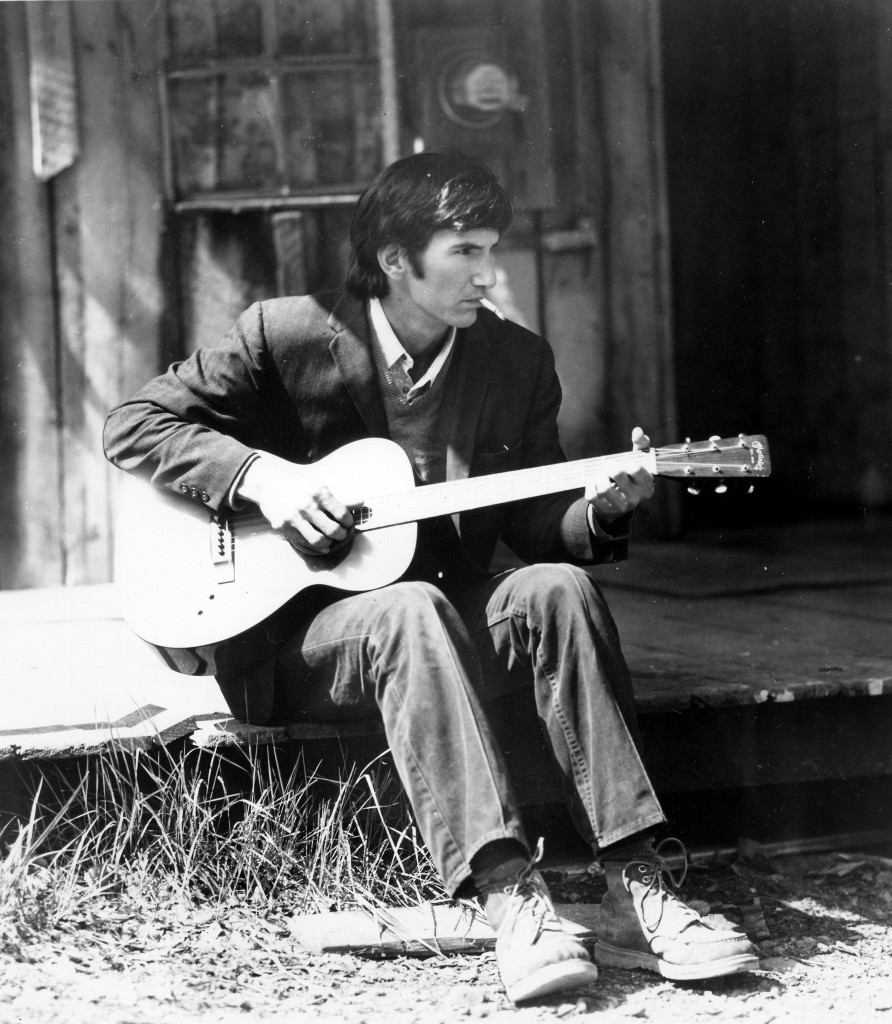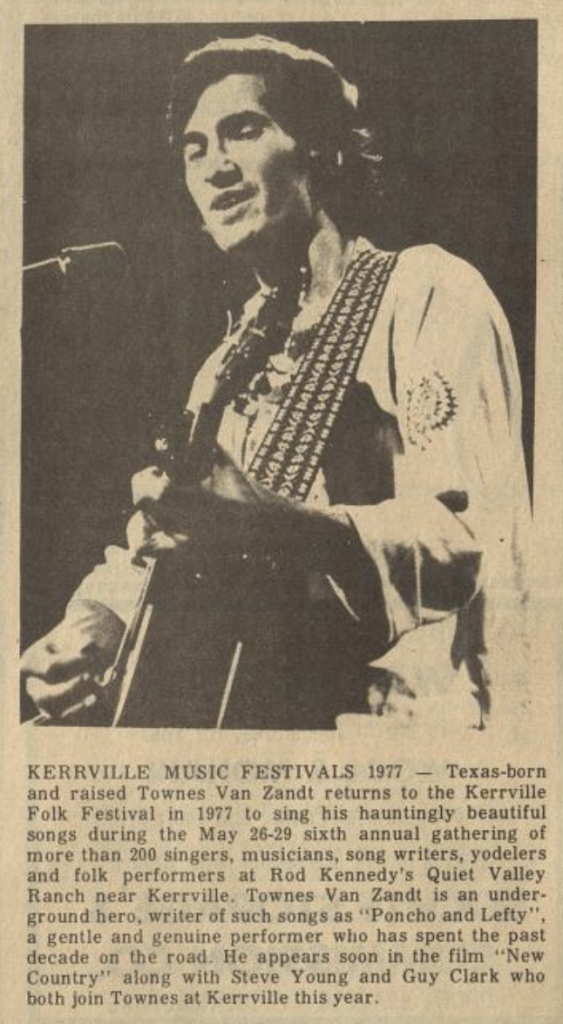
John Townes Van Zandt was born in Fort Worth, Texas, in 1944, to one of the founding families of his home city and into great fortune. His parents had hopes of him attending law school and joining the family’s oil business, but after a stint in higher education, it became clear it wasn’t the path for Van Zandt. His parents brought him home from the University of Colorado after it became apparent he had been struggling with drinking. At home he was diagnosed with bipolar and manic depression which was then treated with insulin shock therapy – which destroyed part of his memory and remains one of his greatest regrets in life. Substance abuse and mental illness would prove to be a continuous thread throughout his life.
Influenced by legends such as Hank Williams, Elvis Presley, and Woody Guthrie, Van Zandt developed a style of songwriting that would solidify his own place amongst his heroes. He was never known for being a particularly gifted singer; it’s his words where he truly shone. His lyricism is deeply personal and poetic in a way that would come to influence even Bob Dylan. He told the stories of those who had been hurt and those who had struggled, narrating his own troubles with alcoholism, depression, and a life of constant traveling, and he told them in a way that drew listeners in and kept them captivated. His performances were quiet and understated, just him and his guitar, yet still he stood with the ranks of louder, full bands.
Though Van Zandt isn’t a household name in the way that Bob Dylan is, his songwriting and style of guitar playing made waves and became hugely influential to future artists. In an advertisement for one of his performances, the Harper Herald newspaper refers to him as an “underground hero.”

One of Van Zandt’s mentees, Steve Earle, may not be the best known of the artists influenced by his music, but is to this day one of his greatest champions, often proclaiming him “the best songwriter in the world.” Earle has told many stories of Van Zandt’s brilliant yet deeply troubled mind, and how he ultimately was his own worst enemy. At a gathering, Van Zandt once picked up a pistol, threw a few bullets into it, and fired at his own head; the chamber was empty, but it’s a fitting metaphor for the way he treated life and himself. He was known as a “doomed romantic” and for his reckless behavior due to substance abuse that often got him kicked out of clubs and bars or carried off stage.
“When somebody’s as good as Townes Van Zandt was and more people don’t know about it, it’s Townes’s fault. For whatever reasons, he shot himself in the foot every damn chance he got…Part of him didn’t consider himself worthy of anything. ”
Steve Earle
Van Zandt’s music is noted for his exceptional lyricism, and his immense talent when it comes to storytelling. One of his best known songs, “Poncho & Lefty,” tells the tale of a Mexican bandit. It’s been covered by numerous other artists over the years; perhaps the best known version is by Merle Haggard and Willie Nelson.
The brutal, sometimes nearly unbearable honestly of Van Zandt’t writing is another quality that drew listeners in. His song “Waiting Around to Die” is, as one might guess, one of the more grueling of his catalog. The song tells the tale of someone who has experienced great loss and pain, simply looking for a way to keep going and pass the time – ultimately, the answer ends up being drugs, Codeine in particular.
Sometimes I don’t know where
This dirty road is taking me
Sometimes I can’t even see the reason why
I guess I keep a-gamblin’
Lots of booze and lots of ramblin’
It’s easier than just waitin’ around to die
….
Now I’m out of prison
I got me a friend at last
He don’t drink or steal or cheat or lie
His name’s Codine
He’s the nicest thing I’ve seen
Together we’re gonna wait around and die
Townes Van Zandt, “Waiting Around to Die”
On the other side of the coin, “To Live is to Fly” is one of Van Zandt’s more hopeful songs, and a display of his deeply poetic style of songwriting.
The choice is yours to make,
Time is yours to take
Some sail upondive into the sea,
Some toil upon the stone.
To live is to fly
Low and high,
So shake the dust off of your wings
And the sleep out of your eyes
Shake the dust off of your wings
And the tears out of your eyes.
Townes Van Zandt, “To Live is to Fly”
Sadly, the years of addiction and mental illness took their toll on Van Zandt’s body, and he passed away in 1977 after suffering a heart attack while recovering from hip surgery; he was only 52 years old, and it’s believed his lifestyle contributed greatly to his early demise. Even with a lifespan cut short, his legacy is enormous. Multiple documentaries and books have been created about his life, has won numerous posthumous awards, and his songs have been covered by artists such as Bob Dylan, Willie Nelson, Counting Crows, Jason Isbell, Frank Turner, Emmylou Harris, and many more. The list of artists who have cited Van Zandt as an influence is a mile long and includes the likes of Neil Young, the Avett Brothers, Robert Plant and Allison Krauss, John Prine, Garth Brooks, Conor Oberst, Kings of Leon, Shakey Graves, and countless more.
Works Cited:
clevelandlivemusic. “Townes Van Zandt – Snowin’ on Raton + If I Needed You + Pancho and Lefty Texas Connection 1990.” YouTube, YouTube, 20 June 2020, www.youtube.com/watch?v=SkQKzzC9MRk.
“Country Singer-Songwriter Townes Van Zandt Dies at 52.” The Washington Post, WP Company, 4 Jan. 1997, www.washingtonpost.com/archive/local/1997/01/04/country-singer-songwriter-townes-van-zandt-dies-at-52/93f93e2b-05eb-4d3f-a997-a152bedb72de/.
Decurtis, Anthony. “Freeing a Mentor from His Mythology.” The New York Times, The New York Times, 8 May 2009, www.nytimes.com/2009/05/10/arts/music/10decurtis.html.
Dietel, Norman J. The Harper Herald (Harper, Tex.), Vol. 61, No. 21, Ed. 1 Friday, May 27, 1977, newspaper, May 27, 1977; Harper, Texas. (https://texashistory.unt.edu/ark:/67531/metapth1034933/m1/1/?q=%22townes%20van%20zandt%22: accessed November 1, 2021), University of North Texas Libraries, The Portal to Texas History, https://texashistory.unt.edu; crediting Harper Library.
McVey, John, and Laurie E Jasinski. “Van Zandt, John Townes (1944–1997).” TSHA, 7 Dec. 2006, www.tshaonline.org/handbook/entries/van-zandt-john-townes.
Steven Fromholz and Townes Van Zandt, video, May 4, 1990; (https://texashistory.unt.edu/ark:/67531/metadc1830943/m1/?q=townes%20van%20zandt: accessed November 1, 2021), University of North Texas Libraries, The Portal to Texas History, https://texashistory.unt.edu; crediting UNT Libraries Special Collections.
Van Zandt, Jeanne, and Will Van Zandt. Townes Van Zandt, townesvanzandt.com/.
Van Zandt, T. (1993, December). Townes Van Zandt Interview. other.

